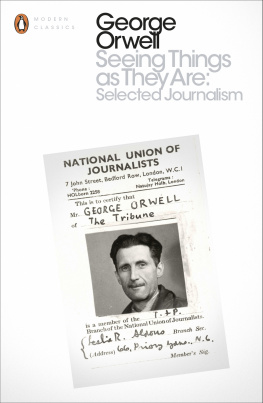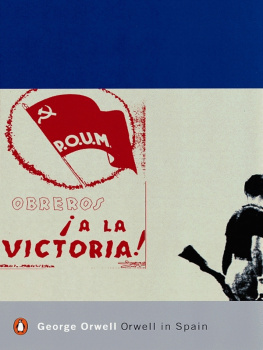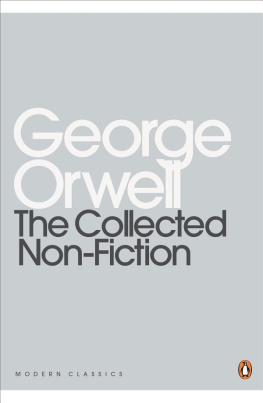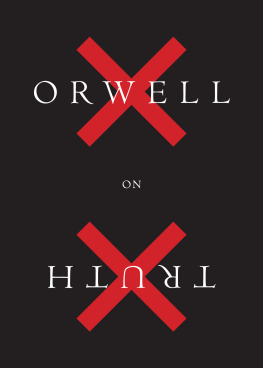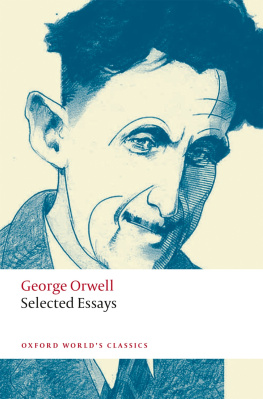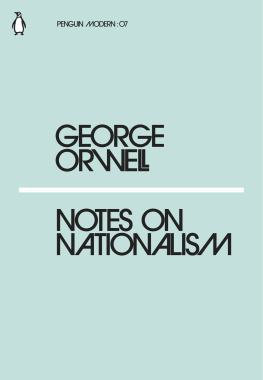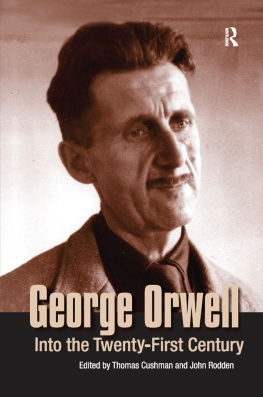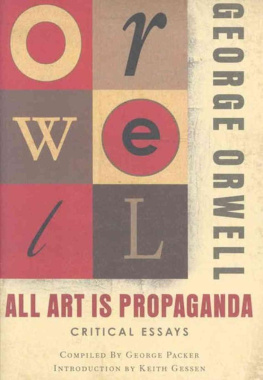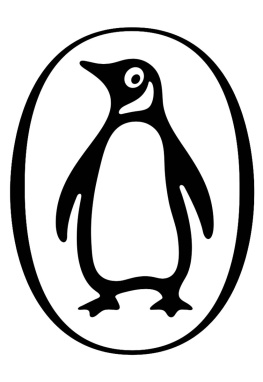George Orwell - Seeing Things As They Are: Selected Journalism
Here you can read online George Orwell - Seeing Things As They Are: Selected Journalism full text of the book (entire story) in english for free. Download pdf and epub, get meaning, cover and reviews about this ebook. year: 2016, publisher: Penguin Books Ltd, genre: Art. Description of the work, (preface) as well as reviews are available. Best literature library LitArk.com created for fans of good reading and offers a wide selection of genres:
Romance novel
Science fiction
Adventure
Detective
Science
History
Home and family
Prose
Art
Politics
Computer
Non-fiction
Religion
Business
Children
Humor
Choose a favorite category and find really read worthwhile books. Enjoy immersion in the world of imagination, feel the emotions of the characters or learn something new for yourself, make an fascinating discovery.
- Book:Seeing Things As They Are: Selected Journalism
- Author:
- Publisher:Penguin Books Ltd
- Genre:
- Year:2016
- Rating:3 / 5
- Favourites:Add to favourites
- Your mark:
- 60
- 1
- 2
- 3
- 4
- 5
Seeing Things As They Are: Selected Journalism: summary, description and annotation
We offer to read an annotation, description, summary or preface (depends on what the author of the book "Seeing Things As They Are: Selected Journalism" wrote himself). If you haven't found the necessary information about the book — write in the comments, we will try to find it.
Seeing Things As They Are: Selected Journalism — read online for free the complete book (whole text) full work
Below is the text of the book, divided by pages. System saving the place of the last page read, allows you to conveniently read the book "Seeing Things As They Are: Selected Journalism" online for free, without having to search again every time where you left off. Put a bookmark, and you can go to the page where you finished reading at any time.
Font size:
Interval:
Bookmark:



UK | USA | Canada | Ireland | Australia
India | New Zealand | South Africa
Penguin Books is part of the Penguin Random House group of companies whose addresses can be found at global.penguinrandomhouse.com.

First published by Harvill Secker 2014
First published in Penguin Classics 2016
Collected from The Complete Works of George Orwell, edited by Peter Davison, OBE, published in Great Britain in 1998 by Secker & Warburg
The title is a quotation from Why I Write, CW, XVIII, 318: Desire to see things as they are, to find out true facts and store them up for the use of posterity.
Copyright the Estate of the late Sonia Brownell Orwell
Compilation copyright the Estate of the late Sonia Brownell Orwell, 2014
Introduction and Notes copyright Peter Davison, 2014
George Orwells NUJ membership card is reproduced by kind permission of UCL Library Services, Special Collections
Cover photograph George Orwell Archive, UCL Library Services, Special Collections
ISBN: 978-0-141-98424-7
Eric Arthur Blair (19031950), better known by his pen name George Orwell, was born in India, where his father worked for the Civil Service. An author and journalist, Orwell was one of the most prominent and influential figures in twentieth-century literature. His unique political allegory Animal Farm was published in 1945, and it was this novel, together with the dystopia of Nineteen Eighty-Four (1949), which brought him worldwide fame. His novels and non-fiction include Burmese Days, Down and Out in Paris and London, The Road to Wigan Pier and Homage to Catalonia.

discover more stories like this at Penguin.co.uk
If one discounts what Orwell wrote in his schooldays and the very few scraps that survive from his time in Burma, he was a published author for twenty-one years, from the time the Paris journal Monde published his La Censure en Angleterre (translated from his English text by H.-J. Salemson) on 6 October 1928, to 22 July 1949 when The Socialist Call of New York published his refutation that Nineteen Eighty-Four was an attack on the British Labour Government (see ). It may be slightly fortuitous but the fact that these two publications appeared not in England but abroad and in two different continents says something of his reach as a journalist. In those twenty-one years, as the twenty volumes of his Complete Works and also The Lost Orwell demonstrate, he was remarkably prolific and, almost sixty-five years after his death, he is read even more widely and in many more languages. It is remarkable given that much journalism is ephemeral that a significant amount of Orwells writing is still relevant and speaks directly to us.
Orwell wrote perceptively in his essay Why I Write of what drove him to write. He famously described his own motivation as sheer egoism, aesthetic enthusiasm (hence perhaps his first and life-long attempts at poetry), historical impulse (that is a Desire to see things as they are, to find out true facts and store them up for the use of posterity), and political purpose using the word political in the widest possible sense as the desire to push the world in a certain direction (Orwell and Politics, Penguin Books, 2001, p. 460). He wished, he wrote, to make political writing into an art, and because there is some lie that I want to expose. Journalism is the perfect medium for this, although some journalism unlike Orwells might not be seen as art. Orwell described all writers presumably including himself as vain, selfish and lazy. Orwell lazy? Hardly! In Why I Write he says he wrote his first poem when he was about four or five and he was about sixteen when he suddenly discovered the joy of mere words. He never lost his love of poetry nor his desire to write it and scraps of unfinished poems appear in his last literary notebook. Writing poetry was not his forte, and he would never have claimed to be a poet, but a number of his poems still delight and are included here.
It is clear why Orwell wrote and so is the way he approached writing, but I think we must also ask why he was not merely prolific but seemed so driven as a writer. Time, it must have seemed to him, was not on his side. Indeed, four of his nine books begin with a reference to time, memorably Nineteen Eighty-Four:
It was a bright cold day in April, and the clocks were striking thirteen. [This was originally written as: It was a cold, blowy day in early April, and a million radios were striking thirteen.]
A fifth has a reference not to early morning but to last thing at night:
Mr Jones, of the Manor Farm, had locked the hen-houses for the night, but he was too drunk to remember to shut the pop-holes. Animal Farm
Even in his journalism, such as his review of Peter Flemings News from Tartary (15 August 1936 see ), he can ponder lyrically on passing time:
A journey by train or car or aeroplane is not an event but an interregnum between events, and the swifter the vehicle the more boring the journey becomes. The nomad of the steppe or the desert may have to put up with every kind of discomfort, but at any rate he is living while he is travelling, and not, like the passengers in a luxury liner, merely suffering a temporary death.
With the benefit of hindsight and our knowledge of Orwells wretched health and early death, is it assuming too much to argue that he was driven by a desperate if unconscious need to write whilst he still had life? The idea of wasting time was anathema to him.
Orwell arrived in Burma on 27 November 1922 to serve in the Indian Imperial Police. On returning to England on leave in August 1927 he decided to resign his commission and in the spring of 1928 he went to live in Paris intending to become a novelist. It is unclear whether he wrote one or two novels (he gives both numbers) but he destroyed what he wrote, much to his later regret. However, he did have some success as a journalist, and, indeed, was paid for the seven articles which were published six in Paris and one in England. These articles encapsulate what would be his prime topics of interest: social justice, literary criticism, the evils of imperialism, censorship, and a format that he virtually created: popular culture (which appeared in the title of one of his books when published in New York decades before it became fashionable in universities). Two representative articles have been selected for inclusion here that on popular journalism and one on the evils of Empire. Although Orwell continued to the end of his days to strive for success as a novelist, three of his nine books are the product of his journalism in a form in which he excelled: documentary reportage
Font size:
Interval:
Bookmark:
Similar books «Seeing Things As They Are: Selected Journalism»
Look at similar books to Seeing Things As They Are: Selected Journalism. We have selected literature similar in name and meaning in the hope of providing readers with more options to find new, interesting, not yet read works.
Discussion, reviews of the book Seeing Things As They Are: Selected Journalism and just readers' own opinions. Leave your comments, write what you think about the work, its meaning or the main characters. Specify what exactly you liked and what you didn't like, and why you think so.

